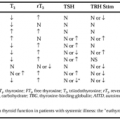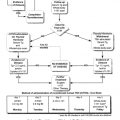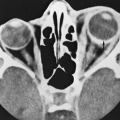MECHANISM OF ACTION OF EXCESS IODIDE
Part of “CHAPTER 37 – ADVERSE EFFECTS OF IODIDE“
When a small amount of iodide (100–250 μg per day) is administered along with the usual dietary intake, there is no appreciable change in iodine-131 (131I) uptake, and no change in thyroidal organic iodine or in the amount of iodotyrosines and iodothyronines produced.25 After larger, single iodide doses (several milligrams), the formation of organic iodine within the thyroid decreases and the monoiodotyrosine/diiodotyrosine ratio16,26 This increases, resulting in decreased T4 and T3 formation. inhibitory effect of iodide on organification and thyroid hormone formation is known as the Wolff-Chaikoff effect. A high concentration of inorganic iodide within the thyroid is necessary for this effect to occur. This inhibition serves as temporary protection against the production of excess amounts of thyroid hormone in the period after the excess ingestion. The inhibitory effect is temporary because the intrathyroidal iodine concentration ultimately decreases as a result of reduced iodide transport; the result is resumption of organic iodine formation and “escape” from the Wolff-Chaikoff effect. Larger doses, including those in normal daily intake of iodide,27 have an additional independent effect on the thyroid gland to block the release of thyroid hormone. Intrathyroidal excess iodide appears to inhibit proteolysis of thyroglobulin, thereby inhibiting the release of stored T4 and T3 into the circulation. Although this effect may be seen in healthy persons, the diminished hormonal release does not result in hypothyroidism because a decreasing peripheral T4 level stimulates a rise in serum thyroid-stimulating hormone (TSH) and augmented T4 production from the thyroid. Large doses of stable iodine induce an acute reduction in T4 release from the thyroid gland and are used as effective short-term therapy for Graves hyperthyroidism (see Chap. 42). This acute inhibitory effect of iodide is of therapeutic value when a rapid reduction in thyroid hormone secretion is desirable, as in severe hyperthyroid states, in preparation for surgery, or in the treatment of thyroid storm. Five drops of SSKI (190 mg of iodine) or 15 drops of Lugol solution (135 mg of iodine), given two to three times a day, quickly and dramatically decreases thyroid hormone release.28 Although these dosages also block organification, the major effect is on hormone secretion. The use of iodides as the only antithyroidal drug in hyperthyroidism is not recommended, because they are only partially and transiently effective in reducing serum hormone levels. A period of 10 to 14 days is required before the thyroid gland adapts, and the production and release of T4 resume.
Stay updated, free articles. Join our Telegram channel

Full access? Get Clinical Tree







